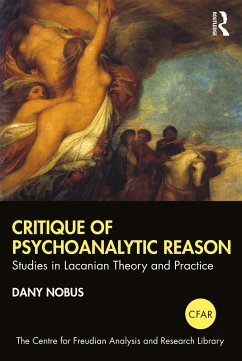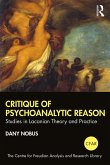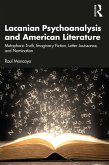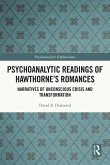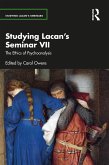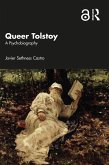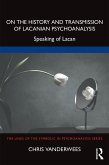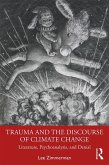In nine interrelated chapters, the book highlights both the flaws and the strengths of Lacan's ideas, in areas of investigation that are as crucial as they are contentious, within as well as outside psychoanalysis.
Dieser Download kann aus rechtlichen Gründen nur mit Rechnungsadresse in A, B, BG, CY, CZ, D, DK, EW, E, FIN, F, GR, HR, H, IRL, I, LT, L, LR, M, NL, PL, P, R, S, SLO, SK ausgeliefert werden.
"In his fast-paced Critique of Psychoanalytic Reason, Nobus asks crucial questions about Lacan's theories and practice, not shying away from embarrassing issues like the use of variable sessions, the rationale of exorbitant fees, and traces of male chauvinism. Mapping the entire Lacanian field, this alert and funny book constructs a decagon-a polygon close to a circle-whose ten concepts are angles from which diagonals crisscross strategically. We follow effortlessly Lacan's histories, theories and inventions, effectively squaring the circle of Freudian Unreason."
Jean-Michel Rabaté, Professor of English and Comparative Literature, University of Pennsylvania, USA; Fellow of the American Academy of Arts and Sciences
"In this hugely impressive book, which is written with exemplary clarity, erudition and verve, Dany Nobus dares to ask profound and daunting questions about why Lacan remains such a vital and challenging motivator for thinking. Propelled by the force of this question ("Why Lacan?"), Nobus enters into the most vexed and enriching zones of psychoanalytic reflection and takes the reader along with him. The book is thought-provoking, wonderfully argued, pedagogical, and playfully lucid. It is also a gripping read that will help re-introduce Lacan to a new generation of thinkers."
Elissa Marder, Professor of French and Comparative Literature, Emory University
Jean-Michel Rabaté, Professor of English and Comparative Literature, University of Pennsylvania, USA; Fellow of the American Academy of Arts and Sciences
"In this hugely impressive book, which is written with exemplary clarity, erudition and verve, Dany Nobus dares to ask profound and daunting questions about why Lacan remains such a vital and challenging motivator for thinking. Propelled by the force of this question ("Why Lacan?"), Nobus enters into the most vexed and enriching zones of psychoanalytic reflection and takes the reader along with him. The book is thought-provoking, wonderfully argued, pedagogical, and playfully lucid. It is also a gripping read that will help re-introduce Lacan to a new generation of thinkers."
Elissa Marder, Professor of French and Comparative Literature, Emory University

